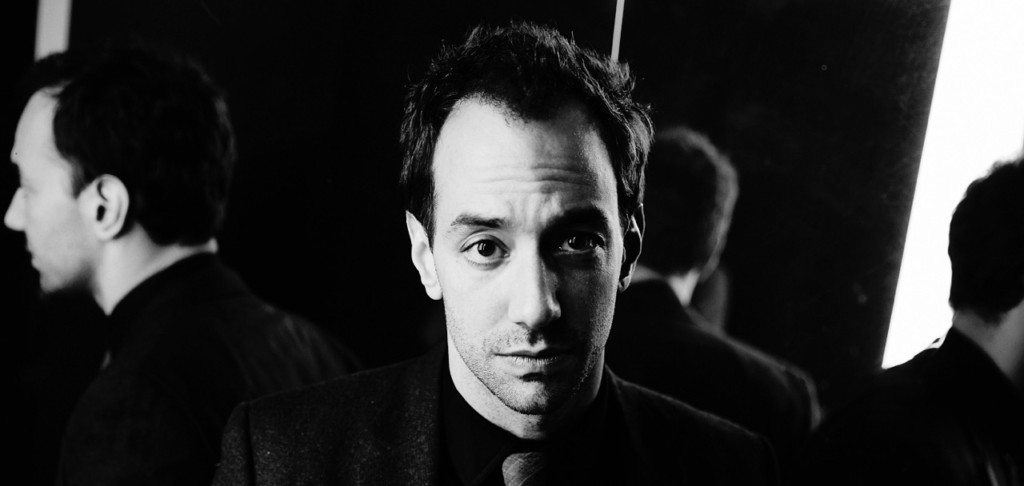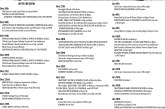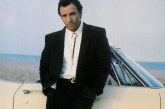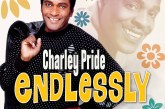Albert Hammond Jr’s musical career has been quite a ride.
As the son of a famous musician, Hammond stayed away from playing music until his teens. But after discovering Buddy Holly, he hit it the ground running and became a founding member of one of the most important rock bands of the 2000’s. His work with The Strokes may be what most know him for, but his solo career has been one of success as well. Hammond Jr. released his debut album (Yours to Keep) in 2006, and since then, he has released two critically acclaimed full lengths and an EP.
His latest solo project, Momentary Masters, could be his most complete work to date and stands as a recap of his experiences so far on this little blue dot called Earth.
Hammond Jr. has worn a lot of hats over the course of his career and, as is the case with most expanding endeavors, there have been a few bumps in the road.
He launched a clothing line of dapper suits in 2009 and he played every instrument except the drums on his aforementioned EP, appropriately titled: AHJ.
Hammond Jr also dealt with a pretty hefty drug addiction for a period of his early career, but as a sober man, he seems to have made peace with himself creatively and it’s evident on his latest release, which puts him on the road for a tour that will stop in Nashville at the Exit/In on September 30th. (Tix can be found here)
We were fortunate to catch up with Hammond Jr. amidst his worldwide voyage and chat about his journey thus far and what to expect in the future.
BLANK: Our first exposure to your solo work was ¿Cómo Te Llama? and we all enjoyed it so much that it ended up on our best albums of the decade list. As a result we were really dying to hear another full length from you. What took so long?
Albert Hammond Jr. : When I got back from rehab we did two Strokes records and when we weren’t doing anything I did the EP and started touring it. By the end of the tour, I had put this really exciting band together, both on and off stage and I wanted to see what certain songs would sound like with them and it was that excitement and the dream of working out arrangements with a band that did it.
BLANK: So I went backwards and bought Yours to Keep, which I also enjoyed. After a few listens, I feel like the new one might end up being my favorite though. Do you have favorite albums or songs that you are a part of or are they all a part of the journey?
AHJ: Both. They’re all part of a bigger thing and each one has their own journey that takes you somewhere and then you also have favorites…a lot of times it changes with the feeling you’re having at a certain time.
BLANK: What prompted your solo career? Was it an urge to explore sounds of your own or did you just have some songs that you were ready for folks to hear?
AHJ: To be honest, I’ve always been writing. I’ve been wanting to write music and sing and play guitar since I fell in love with John Lennon and Buddy Holly. I was 26 and I was thinking, “Man, I’ve really gotta finish these songs I have so I can progress. I felt that if I kept them in the demo stage like I always did…its’ just too easy and I needed to face that. So I felt like Yours to Keep and ¿Cómo Te Llama? and the EP were kind of me figuring things out and this one feels like the culmination of all those things put together. As kind of a late bloomer I kind of feel like it’s my debut record.
BLANK: Would you have been fine with these songs being Strokes songs or were they always going to be separate?
AHJ: I never thought about it. I tried sometimes for them to be Strokes songs but they never worked out so I just created my own thing and then when we didn’t tour Comedown Machine it was (a situation where) I’d been through a lot, trying to figure out what to do. After rehab I didn’t know if I wanted to play music anymore and I didn’t know who I was, and then there was this discovery of, “I want to see if I can stand on my own two feet,” and that’s where (the songs) went.
BLANK: How do you choose your own musicians for your albums? Do you look for a certain sound or stage presence?
AHJ: It’s hard. It’s been a process and it finally just kind of came together. It’s a way you play, stage presence is always great but for what I’m doing now I’d rather have someone that plays a certain way. It’s the way you get along and you try to pick people who are aren’t going to “yes” you and who are going to tell you how they feel about something. When you go from a band that’s successful to your own thing, sometimes people don’t say anything and that’s what you have to be careful about.
BLANK: So the forming of the new band was the catalyst for the new record?
AHJ: Yeah. It’s always a mixture of things that start something. I had songs that I was excited about and I also had this band, so it was like, “Let’s see what happens.” I had these three songs demoed and we started playing them and rearranging stuff and that felt exciting and cool and that created new things for me to do. All of a sudden I had new parts to the songs so then I started bringing songs that were in an earlier stage, which I had never done before. It’s a very vulnerable thing to do and they all embraced it so much that it was fun to see.
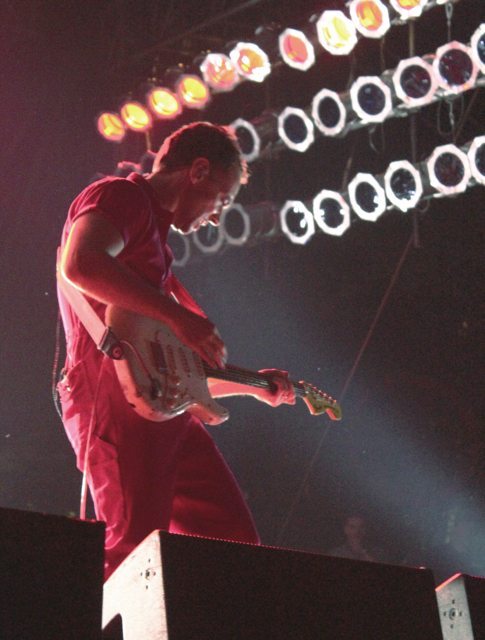
BLANK: In terms of songwriting, what’s the difference between being the person the band is named after and being the guitar player for a band? Is there more pressure there?
AHJ: It all depends on the dynamics of the band. There’s a different responsibility during the show. Your performance is different when people are there to see you but when it comes to the show I rely on all of their great playing to do what I do. I’m bringing in the songs and I want the songs to do what I want them to do, so there’s that pressure on me, but that’s why you got in to the business. You like that so it’s fun and it doesn’t really seem like it’s unnecessary pressure.
BLANK: There’s a pretty far reaching piece of text from Carl Sagan in your album packaging. It’s a sprawling piece of work and I wanted to know what those particular words mean to you and why you chose it.
AHJ: It was this three minute youtube clip that I would use to relax. It would make me feel better and feel at ease. So I was thinking, “Should I play it before I go out?” and then I thought that no one is going to listen to three minutes of talking so I decided to put it in the CD. You know, people get music and it puts them in a different place and if it puts you anywhere near where it put me then we’re just sharing something that we like. I got the title for the record from that (too) and there’s just something about it that gives you a different perspective. I think once you read it then you hear the music differently.
BLANK: I also noticed that you gave the members of your band some extra burn in the liner notes on the latest album. It’s refreshing to see someone include some often overlooked parts of the fam (like the producer and photographer). What made you decide to include everyone in such detail?
AHJ: The mixture really excited me. I felt like it was this team of people that in different steps created something that I couldn’t have done alone. I like the feel of a community that makes something better than it can be by itself. I feel like there is something inspiring about that in general.
BLANK: Did your pops have a big influence on you musically?
AHJ: When I was young I didn’t think I was going to play music. I got in to it when I was a teen and strangely enough, and I don’t know if it was subconscious or if I had to do it for my own sake, whenever I fell in love with music I had to separate it from my dad. Maybe it was from growing up and seeing it and it just came out one day, but when I fell in love with it, I really did it on my own. The best advice he gave me was…he just wanted to make sure I didn’t want to do it to be famous. He was probably thinking about all the things he had been through and there’s a lot of luck that comes in businesses like this that no one really wants to talk about, so I think he was worried about that. And my mom was like my champion. It was kind of a good balance to be honest.
BLANK: What did make you fall in love with music originally?
AHJ: Buddy Holly. There was this show, kind of like a Broadway show, that told his story and I was enamored right away. I wanted to be him so bad. It was the first time I felt an impact where I went from a kid to “I think I want to do that”. It was different, you know? You’re just a kid hanging out, riding your bike and then something grabs you for life.
BLANK: So what’s next for you, whether it be a Strokes thing or a solo thing?
AHJ: I’m going to tour this thing for the next 9 months or a year and I always have new stuff I’m working on. I’ve got some new songs that I want to try out with these guys but I’m just so focused on the moment of playing good shows. I’m trying to pace myself like an athlete while I’m on the road, which I really like. It’s about the show and the performance and I’m giving my time to that. And when I have little breaks I can focus on those other things, but for now I really want to zone in on doing a great show.
Tickets to the September 30, 2015 show in Nashville are available here.
UPDATE: According to Julian Casablancas, The Strokes are planning to make a new album. During the bands headlining performance at the Landmark Music Festival in Washington DC on September 27th, Casablancas mentioned the news on stage.



